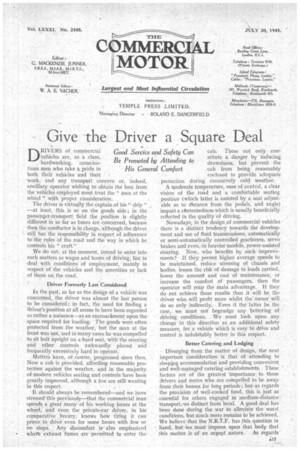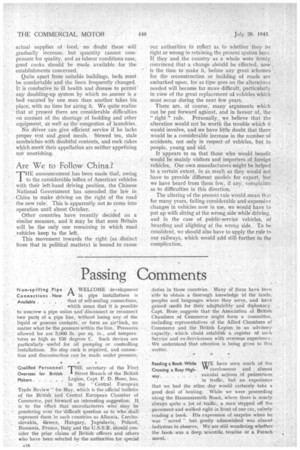Give the Driver a Square Deal
Page 19

Page 20

If you've noticed an error in this article please click here to report it so we can fix it.
DRIVERS of commercial vehicles are, as a class, hardworking, conscientious men who take a pride in both their vehicles and their work, and any transport concern or, indeed, ancillary operator wishing to obtain the best from the vehicles employed must treat the " man at the wheel " with proper consideration. . The driver is virtually the captain of his" ship" —at least, this is so on the goods side ; in the passenger-transport field the position is slightly different in so far as buses are concerned, because then the conductor is in charge, although the driver still has the responsibility in respect of adherence to the rules of the road and the way in which he controls his " craft."
We do not, at the moment, intend to enter into such matters as wages and hours Of driving, but to deal with conditions of employment, mainly in respect of the vehicles and the amenities or lack of them on. the road.
Driver Formerly Last Considered In the past, so far as the design of a vehicle was concerned, the driver was almost the last person to be considered ; in fact, the need for finding a 'driver's position at all seems to have been regarded as rather a nuisance—as an encroachment upon the space required for loading. The goods were often protected from the weather, but the man at the front was not, and in many cases he was compelled to sit bolt upright on a-hard seat, with the steering and other controls awkwardly placed arid frequently excessively hard to operate.
Matters have, of course, progressed since then. Now a cab is provided, affording reasonable projection against the weather, and in the majority of--modern vehicles seating and controls have been greatly improved, although a few are still wanting in this respect. • , It should always be remembered—and we have stressed this previously—that the commercial man spends a great many of his working hours at the wheel, arid even the private-car driver, in his • comparative luxury, knows how tiring it can prove to drive even for some hours with few or• no stops. Any discomfort isalso emphasized vehefe exhaust fumes are permitted to enter the cab. These not only constitute a danger by inducing drowsiness, but prevent the cab from being reasonably enclosed to provide adequate , protection during excessively cold weather. A moderate temperature, ease of control, a clear vision of the road and a comfortable seating position (which latter is assisted by a seat adjustable as to distance from the pedals, and angle) impart a cententedness which is usually beneficially reflected in the quality of driving.
Nowadays, in the design of commercial vehicles there is a distinct tendency towards the development and use of fluid transmissions, automatically or semi-automatically controlled gearboxes, servo brakes arif.1 even, ,in heavier noclels, power-assisted steering. Now, who benefits by such improvements? If they permit higher average speeds fo be maintained, reduce stressing of chassis and bodies, lessen the risk of damage to loads carried, lower the amount and cost of maintenance, or increase the comfort of passengers, then the operator will reap the main advantage. If they do not achieve these results then it will be the driver who will profit more whilst the' owner will do so only indirectly. Even it the latter be the case, we must not begrudge any bettering of driving conditions. We must look upon any change in this direction as an additional safety measure, for a vehicle which is easy to drive and control is indubitably better in this respect.
Better Catering and Lodging Diverging from the matter of design, the next important consideration is that of attending to sleepg accommodation and providing convenient and well-managed catering establishments. These _ factors are of the greatest importance to those drivers and mates who are compelled to be away from' their homes for long periods ; but as regards the provis.ion of well-cooked food, this is. just as essential for others engaged in medium-distance transport,-as distinct from local. A good deal has been done during the war to alleviate the worst conditions, but much more remains to be achieved. We believe that the N.R.-T.F. has this question in hand, but ive must impress upon that body that this matter is of an_ urgept nature. As regards ku actual supplies of food, no doubt these will gradually increase-, but quantity cannot compensate for quality, and as labour conditions ease, good cooks should be made available for the establishments concerned. Quite apart from suitable buildings, beds must be comfortable and the linen frequently changed. It is conducive to ill health and disease to permit' any doubling-up system by which no _sooner is a bed vacated by one man than another takes his place, with no time for airing it. We quite realize that at present there are considerable difficulties on account of the shortage of bedding and other equipment, as well as thecongestion of laundries. No driver can give efficient service if he lacks proper rest and .good meals.Stewed tea, stale sandwiches with doubtful contents, and rock cakes which merit their appellation are neither appetizing nor nourishing.
Are We to Follow China ?
THE announcement has been made that, owing to the considerable influx of American vehicles with their left-hand driving position, the Chinese National Government has amended the law in China to make driving on the right of the road the new rule. This is apparently not to come into operation until about October. Other countries have recently decided on a similar measure, and it may be that soon Britain will be the only one remaining in which road vehicles keep to the left. This movement towards the right (as distinct from that in political matters) is bound to cause our authorities to reflect as. to whether they be right or wrong in retaining the present system here. If they and the country as a whole were firmly, convinced that a change should be effected, now ' is the time to make it, before any great 'schemes for the reconstruction or building of roads are embarked upon, for as time goes on the alterations needed will become far more difficult, particularly in view of the great replacement of vehicles which must occur during the next few years. There are, 6'f course, many arguments which can be put forward against, and in favour of, the " right " rule. Personally, we believe that the alteration would not be worth the trouble which it would involve, and we have little doubt that there would be a considerable increase in the number of accidents, not only in respect of vehicles, but to people, young and old. It appears to us that those who would benefit would be mainly visitors and importers of .foreign vehicles. Our own manufacturers might be helped to a. certain extent, in as much as they would not have to provide different models for export, but we have heard from them few, if any, complaints as to difficulties in this direction. The altering ofthe_ present rule would mean that for many years, failing considerable and-expensive changes in vehicles now in use, we would have to put up with sitting at the wrong side while'driying, and in the case of public-service vehicles, of hoarding and alighting at the wrong side. To be consistent, we should also have to apply the rule to our railways, which would add still further to the complication.




























































